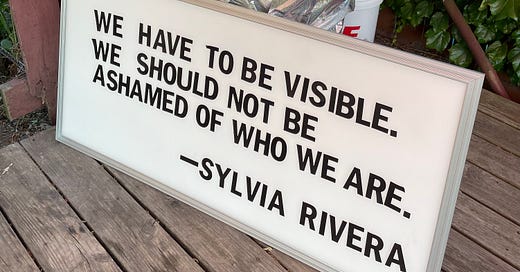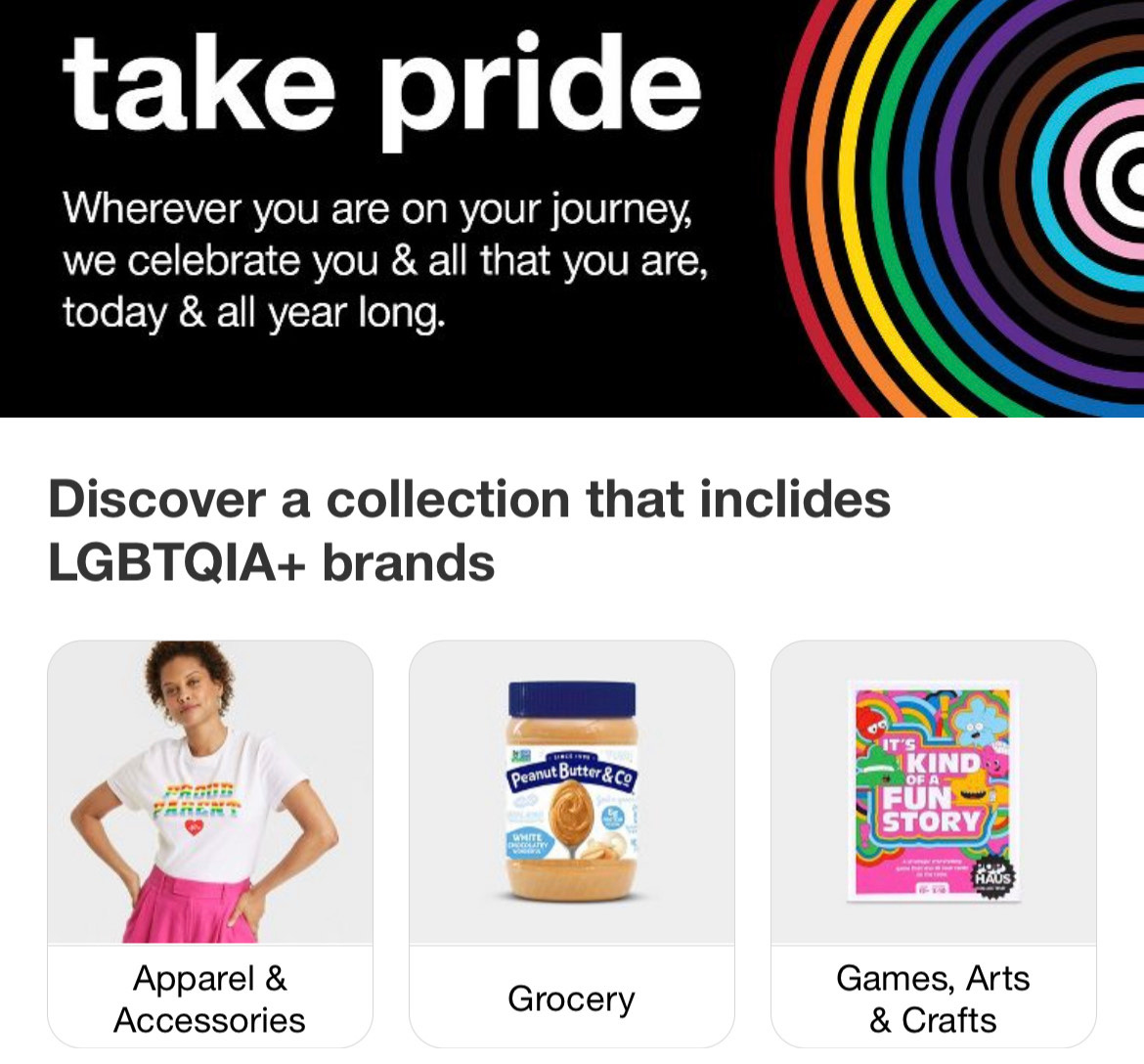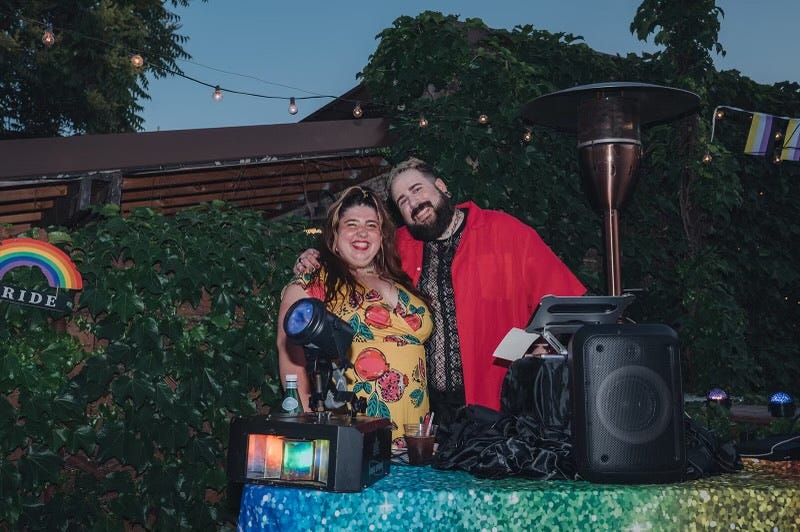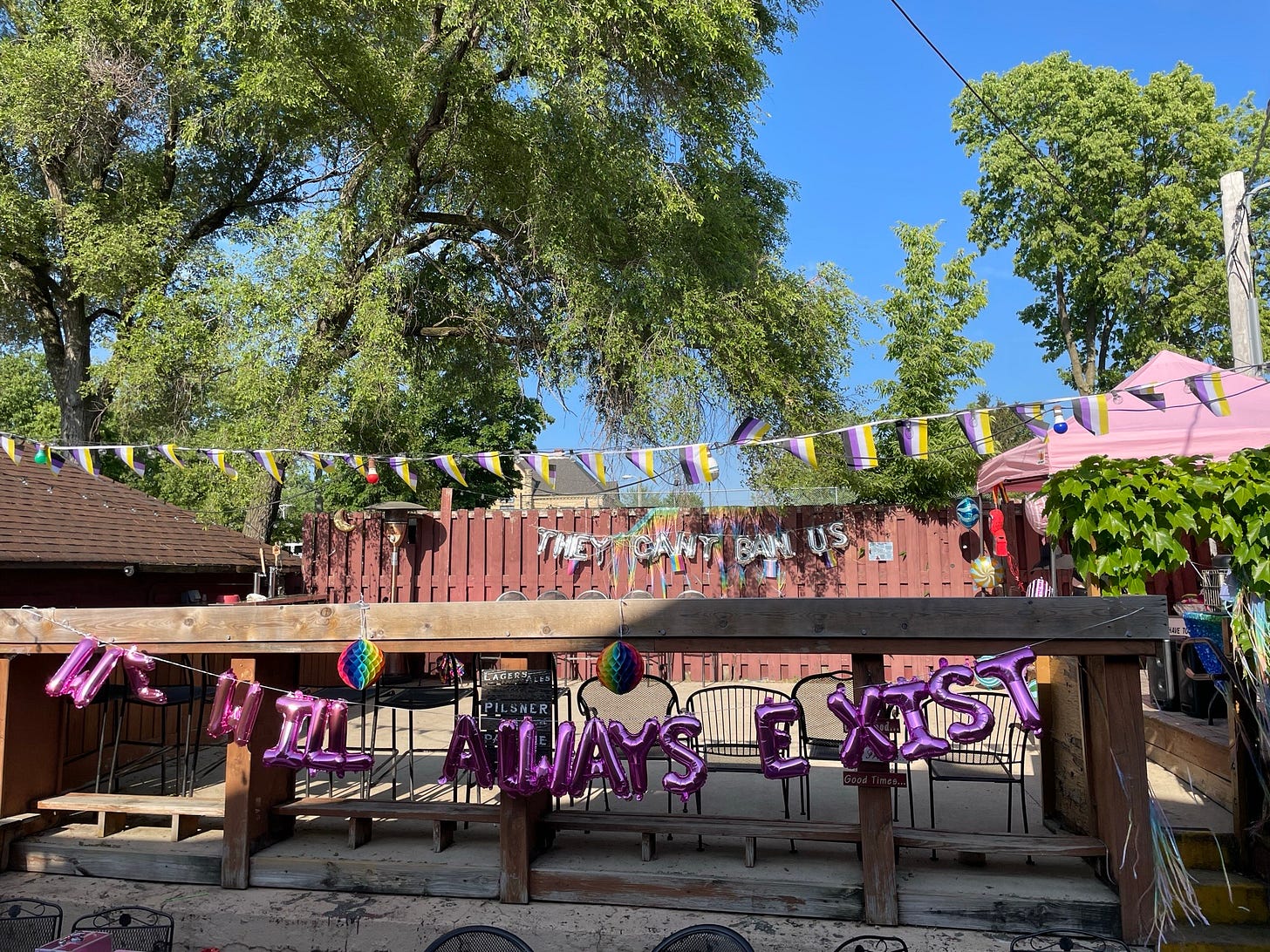it’s about to be a bumpy pride month. here’s what you can do.
Target abruptly abandoning its Pride collection doesn’t exactly bode well.
Queering the Burbs is a regularly-published distillation of pop culture, politics and queerness written by Joe Erbentraut. If you like what you see, please consider subscribing (it’s free!), liking or sharing this piece.
It’s almost that time of year again, folks. As I write this, we are a matter of weeks away from the start of June and the commencement of Pride Month. Happily, the month will again include a packed schedule of parades, festivals, parties, and other events offering opportunities to gather and celebrate the queer community (including many right here in the suburbs). But unfortunately, I’m afraid last year’s trend of corporations and allies distancing themselves from the community appears very likely to at least continue, if not grow.
The signs are clear and have been a topic of conversation amongst many of my queer artist and activist friends in recent weeks. Many of them are struggling to find the same level of corporate and community sponsorship that they’ve received in the recent past. During what is typically our community’s busiest time of year, some are struggling to book gigs that will help them pay their bills and keep their lights on. Vibes, to put it simply, are off.
Of course, I know times are tough for many businesses and households right now. I’m old enough to remember when a McChicken cost $1, but it seems you can’t even get a basic fast food meal for less than $10 right now. A box of Cheez-It I recently bought at a grocery store was barely larger than my hand and cost more than $7. And so many incredibly talented and hard-working friends of mine remain underemployed as the availability of well-paying full-time jobs is greatly outpaced by the number of qualified individuals looking to fill them.
For an example of what’s happening, look no further than Target, which last year was the recipient of a full-fledged right-wing hate campaign in response to its Pride collection and in-store displays. The backlash resulted in in-store confrontations with staff and the retail chain even pulled a number of items from its collection. Last week, Target announced that its Pride collection this year will only be sold online and “in select stores, based on historical performance.”
And what exactly does this year’s Pride collection entail? A search of the Target app on my phone as of this writing returns a hodge podge of items, many of which have seemingly little to do with queer people. There’s a family board game called “It’s Bananas.” About 10 different flavors of kombucha. We’ve got multi-colored pom-pom garland. A pink heart rubber chew toy for dogs. A Pride-themed rose wine. Some pairs of tights.
Some of these items purportedly come from queer-owned makers, which is great, but the selection still remains a far cry from years past, such as when Target sold a seriously inspired “Tired & Gay” coffee mug (we bought two). Queer creator Alysse Dalessandro noticed this trend too, posting to Threads last week that “the fact that brands are *this* afraid to support us speaks volume about the state of LGBTQ safety in the US.” As Dalessandro puts it, Target didn’t simply scale back their Pride collection by removing it from some stores this year—they actually decided for all practical purposes not to do one at all.
And if you’re wondering if it really matters what a global corporation does or doesn’t do for Pride month, Dalessandro also spoke to this and pointed out that the decision does have a real financial impact for many queer creatives including the queer brands paid to design items for the collections, queer models who model the items, drag artists who earn licensing fees from their likeness being featured in merchandise, as well as queer creators making affiliate income from promoting the items. So while, of course, no corporation will deliver queer people, their backing is incredibly meaningful for those creatives who benefit from their Pride campaigns.
“The way I look at it? This all adds up to less money for LGBTQ creatives,” Dalessandro concluded.
Meanwhile, the need for queer advocacy and support could not be more urgently needed. This is a presidential election year after all, and one of the candidates for the White House this November just vowed in an interview last week to reverse Title IX protections for transgender students on “day one” of his term if he is elected. This candidate has also promised to sign a nationwide ban on trans student-athletes competing in accordance with their gender identity, as well as a federal law that would recognize only two genders.
These stated priorities are in line with the Heritage Foundation’s Project 2025, a comprehensive document that outlines the right-wing think-tank’s hopes and dreams for a second presidential term for that particular candidate. Other anti-queer and anti-trans legal changes that Project 2025 calls for, as reported by PBS, include reinstating a transgender military ban, limiting LGBTQ workplace protections, rescinding trans healthcare protections, banning gender-affirming care for minors, and a condemnation of same-sex marriage, among a litany of other Christian nationalist wet dreams.
Against that backdrop, queer activists throughout the country are continuing to fight against hateful anti-trans and anti-LGBTQ legislation at the state and local levels, too. In Louisiana, an anti-trans bathroom bill advanced last week. In Minnesota, an anti-LGBTQ religious exemption law was restored. In Tennessee, anti-LGBTQ individuals were explicitly granted the right to adopt and foster children.
Elsewhere, legislation like the above are also being voted down or dying on the vine thanks to the hard work of this community and its allies, but those efforts require ongoing support in order to be sustainable for those who fight these battles. This support cannot be conditional or unreliable. In order to be most meaningful and effective, support and allyship needs to be sustained as an intense presidential election cycle approaches its closing months.
I know there’s a lot going on. It sometimes feels empty to talk or write about objectively horrifying and seemingly endless humanitarian crisis in Gaza. (#ceasefireNOW) We are living on a planet that is getting hotter and more prone to extreme weather by the minute, with no meaningful plan for action coming from our leaders. The cicadas are also coming.
Thankfully, this is one issue where there are some pretty straightforward actions that can be taken to make a meaningful difference, right here in the communities we call home.
If you are able, I urge anyone reading this to do whatever is within your power and allowable by your present financial reality to support the queer and trans artists and activists who are doing the work to help our community thrive and survive. For many of us, Pride Month each year is accompanied by a deluge of incoming requests to speak or appear at community events, and many of those engagements are unpaid. But “love wins” and good vibes don’t pay the bills, and if this work to support the life and livelihoods of queer people and our futures is to continue, it needs to be funded.
Below are six ways you can support the queer and trans community in the western suburbs and beyond this Pride Month and throughout the year. If you lack the finances to make a donation or buy a ticket toward any of the below causes, you can also do these folks and organizations a huge favor by sharing their message and work on social media, writing positive Google reviews, or simply spreading some good old-fashioned word of mouth about them to others who you think would benefit from their services. Every little bit goes a very long way.
Become a supporter of Batavia’s own Annie Hex on her just-launched Patreon, which supports Annie’s efforts to spread queer joy for LGBTQ+ adults and youth throughout the suburbs. Memberships start at $3/month.
Become a sponsor of (or buy a ticket to) Annie Hex’s next Queer Prom, taking place on Friday, June 14 in Batavia. Annie also recently opened up pre-orders for her newest book, Diary of a Little Spoon.
Make a plan to attend or spread the word about Slo Mo and Kido Chicago’s second annual Queer Fam Pride Jam at Millennium Park on Sunday, June 2.
Make a donation to or consider volunteering for one of the many lovely queer nonprofits in the area, such as Belong: Fox Valley, Youth Outlook, Out of the Closet Charity, Aurora Pride, Naper Pride, and Elgin Pride.
Support a local queer or ally-owned business. While my most recent Queering the Burbs holiday shopping guide is not an exhaustive list of every local business that falls within this category, it’s a good place to start and is a resource I’ll continue to update every year.
Venmo the most broke one of your queer or trans friends right now.
Above all, if you are booking a queer or trans artist this Pride Month or beyond, pay us and pay us well—at the top of your budget. For many of us, this month is like the month of December for mall Santas, and as we all know, this world is not getting cheaper to live in. We’re exhausted and frustrated. We could use the love.
Let’s not just hope for a beautiful Pride Month and peace in this wild world. We can make it happen.
LINK DUMP
Vogue: JFK’s Grandson, Jack Schlossberg, Is Memeing for Democracy
New York Times: Farewell, Chuck E. Cheese Animatronic Band
Vox: Eurovision is supposed to be fun and silly. This year is different.
The Daily Beast: ‘Anything But You’ Showcases the Worst Thing about Modern Rom-Coms
Eater: Trudging Through the Tedious Swamp of Celebrity Brand Deals
SONG OF THE RIGHT NOW
Chicago’s own Dehd just dropped their latest album, called Poetry, and I sincerely can’t stop listening to it. Here’s the lead track, “Dog Days.”
Bonus: Bambie Thug was Ireland’s representative at this weekend’s Eurovision Song Contest and they were outspoken about the event’s multiple ethical failures this year. She could best be described as a weirder, witchier Kate Bush (yes, it was possible!) for a new generation, so of course I’m fully on board.








I really like that Dehd song